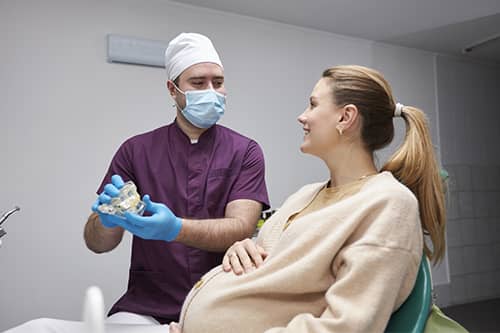
Pregnancy is an exciting and transformational time, but it can also present unique challenges when it comes to taking care of your health. One aspect of health that may be overlooked is oral care. In this blog post, we will explore the importance of dental hygiene during pregnancy, how pregnancy hormones can affect your dental health, the risks of periodontal disease, and tips to maintain good oral health.
Hormonal Changes and Oral Health
During pregnancy, hormone levels fluctuate significantly. Increases in estrogen and progesterone can cause changes to your gum tissue and affect the way your gums react to plaque, leading to “pregnancy gingivitis.” Symptoms could include:
- Swollen and tender gums
- Bleeding while brushing or flossing
- Red or irritated gums
Pregnancy gingivitis can also increase the risk of periodontal disease, which has been linked to premature birth and low birth weight. Therefore, maintaining excellent oral hygiene is essential for not only your own health but also for the well-being of your baby.
Periodontal Disease and Pregnancy
Periodontal disease, or gum disease, is an infection of the tissues supporting your teeth. Pregnant women are at a higher risk for developing periodontal disease due to hormonal changes. Several studies have found associations between periodontal disease and adverse pregnancy outcomes, including:
- Preterm birth
- Low birth weight
- Preeclampsia
- Gestational diabetes
Thus, taking care of your oral health during pregnancy is vital for both you and your baby’s overall health.
Gum Disease Treatment
Scaling and root planing is a non-surgical procedure to treat periodontal or gum disease. The procedure involves the following steps:
- Scaling: Scaling involves the use of special tools to remove the plaque and tartar buildup from the surfaces of the teeth, including the areas below the gumline.
- Root Planing: Root planing involves the smoothing of the roots of the teeth to remove any rough spots that may be home to bacteria and other harmful substances.
- Antibacterial Rinse: After the scaling and root planing are completed, an antibacterial rinse will be used to flush out any remaining bacteria and to promote the healing of the gums.
- Follow-Up Visits: Depending on the severity of the gum disease, follow-up visits may be required to monitor the healing process and assess the overall success of the treatment.
The scaling and root planing procedure is typically completed in multiple visits, with each visit focusing on a different section of the mouth. The procedure is typically performed under local anesthesia to ensure patient comfort during the treatment.
Sedation For Pregnant Women
According to the ADA, nitrous oxide and sedation can potentially harm the developing fetus, so they should be avoided. If scaling and root planing are needed during pregnancy, the procedure would be performed with local anesthetic only.
Tips for Maintaining Good Oral Health During Pregnancy
Here are some practical tips to help you maintain good oral health throughout pregnancy.
- Regular dental check-ups: Schedule a check-up and inform your dentist about your pregnancy. Regular dental exams can help prevent complications from arising and ensure that any dental issues are treated promptly.
- Proper oral hygiene: Brush your teeth at least twice a day using fluoride toothpaste, and make sure to floss daily. This helps prevent plaque build-up and maintains gum health.
- Nutrition: A balanced diet is crucial during pregnancy, not just for your baby’s development but also for your oral health. Eating foods rich in calcium, phosphorus, vitamin C, and vitamin D can help protect your teeth and gum tissues.
- Rinse with mouthwash: Using an antimicrobial mouthwash can help control harmful bacteria that contribute to gum disease. Check with your dentist or obstetrician for recommendations on pregnancy-safe mouthwashes.
- Treat morning sickness: If morning sickness causes vomiting, rinse your mouth with water afterward to neutralize stomach acids that can damage your tooth enamel. Your dentist may also recommend rinsing with a mixture of baking soda and water to neutralize the acid in your mouth.
- Avoid sugary foods and drinks: Limit your intake of sugary snacks and beverages to reduce the risk of tooth decay.
By following these guidelines for pregnancy oral care, you can help protect your teeth and gums during this important phase of your life. Regular dental check-ups, proper oral hygiene, and a balanced diet will go a long way in maintaining your oral health and ensuring a healthy pregnancy.
Trust the Experts at Highlands Ranch Periodontics
If you’re pregnant and in need of a scaling and root planing procedure, the team at Highlands Ranch Periodontics can help. We specialize in periodontal treatments that are tailored to meet your individual needs. Our experienced staff will take the time to discuss your options with you and help make sure you receive the best care possible.
If you are searching for a dentist near me, schedule an appointment at Highlands Ranch Periodontics and Dental Implants. Call (303) 683-1144 or complete the online booking form.
Frequently Asked Questions
Yes, dental X-rays are generally safe during pregnancy as they do not produce enough radiation to cause harm. However, if you are pregnant or suspect that you might be pregnant, please inform your dentist so they can take extra safety precautions and use lead aprons to protect the abdomen area.
Yes, dental cleanings are safe and recommended during pregnancy. However, make sure to inform your dentist about your pregnancy so they can take extra precautions to ensure the safety of both you and your baby.
It is not recommended to whiten your teeth while pregnant since the effects of the bleaching chemicals are unknown. It is best to talk to your dentist about alternatives that may help you achieve a brighter smile without compromising your health or the health of your baby.
